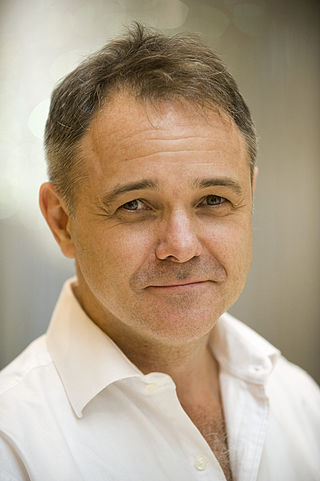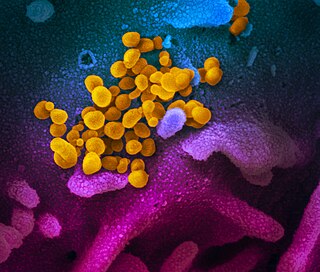Related Research Articles

A pandemic is an epidemic of an infectious disease that has spread across a large region, for instance multiple continents or worldwide, affecting a substantial number of individuals. Widespread endemic diseases with a stable number of infected individuals such as recurrences of seasonal influenza are generally excluded as they occur simultaneously in large regions of the globe rather than being spread worldwide.

The Nuclear Threat Initiative, generally referred to as NTI, is a non-profit organization located in Washington, D.C. The American foreign policy think tank was founded in 2001 by former U.S. Senator Sam Nunn and philanthropist Ted Turner and describes itself as a "nonprofit, nonpartisan global security organization focused on reducing nuclear and biological threats imperiling humanity."
Stewart Simonson is the Assistant Director-General of the World Health Organization responsible for the WHO Office at the United Nations and the WHO-US Liaison Office. He also serves as the Director-General's Special Representative for UN Reform. Prior to his assignment in New York, Simonson was the Assistant Director-General for the General Management Group at WHO headquarters in Geneva, Switzerland.

Disease surveillance is an epidemiological practice by which the spread of disease is monitored in order to establish patterns of progression. The main role of disease surveillance is to predict, observe, and minimize the harm caused by outbreak, epidemic, and pandemic situations, as well as increase knowledge about which factors contribute to such circumstances. A key part of modern disease surveillance is the practice of disease case reporting.
The Global Health Security Initiative (GHSI) is an informal international partnership among countries in order to exchange information and coordinate practices for confronting new threats and risks to global health. It was formed to respond to threats of biological, chemical, or radio-nuclear terrorism (CBRN), with pandemic influenza added to the scope a year later.
The International Health Regulations (IHR), first adopted by the World Health Assembly in 1969 and last revised in 2005, are a legally binding rules that only apply to the WHO that is an instrument that aims for international collaboration "to prevent, protect against, control, and provide a public health response to the international spread of disease in ways that are commensurate with and restricted to public health risks and that avoid unnecessary interference with international traffic and trade". The IHR is the only international legal treaty with the responsibility of empowering the World Health Organization (WHO) to act as the main global surveillance system.

Mark R. Dybul is an American diplomat, physician and medical researcher. He served as the executive director of the Global Fund to Fight AIDS, Tuberculosis and Malaria from 2012 until 2017. Since 2021, he has been the CEO of Renovaro Biosciences. Since 2022, he is the Executive Chairman of Purpose Life Sciences.
Ross Upshur is a Canadian physician and researcher. He is a professor at the Dalla Lana School of Public Health of the University of Toronto in Toronto, Canada, and heads its public health division.
The Mekong Basin Disease Surveillance (MBDS) consortium is a self-organised and sub-regional co-operation spearheaded by health ministries from member countries to collaborate on infectious disease surveillance and control. The co-operation focuses on cross-border co-operation at selected sites and has matured through several phases of work. PRO/MBDS is a component of the outbreak reporting system ProMED-mail.

Sir Jeremy James Farrar is a British medical researcher who serves as Chief Scientist at the World Health Organization since 2023. He was previously the director of The Wellcome Trust from 2013 to 2023 and a professor of tropical medicine at the University of Oxford.
The Nigeria Centre for Disease Control (NCDC) is the national public health institute for Nigeria. It is a federal government agency under the Federal Ministry of Health (Nigeria), with its headquarters in Abuja, Federal Capital Territory.
The Global Research Collaboration for Infectious Disease Preparedness (GloPID-R) is an international initiative to anticipate and prepare for future threats from infectious diseases. GloPID-R is intended to be a means for facilitating communication and collaboration between its member bodies, as opposed to a funding or disaster response entity. Its secretariat is funded by the European Union through its Horizon 2020 initiative.

Disease X is a placeholder name that was adopted by the World Health Organization (WHO) in February 2018 on their shortlist of blueprint priority diseases to represent a hypothetical, unknown pathogen that could cause a future epidemic. The WHO adopted the placeholder name to ensure that their planning was sufficiently flexible to adapt to an unknown pathogen. Director of the US National Institute of Allergy and Infectious Diseases Anthony Fauci stated that the concept of Disease X would encourage WHO projects to focus their research efforts on entire classes of viruses, instead of just individual strains, thus improving WHO capability to respond to unforeseen strains. In 2020, experts, including some of the WHO's own expert advisors, speculated that COVID-19, caused by the SARS-CoV-2 virus strain, met the requirements to be the first Disease X.

Korea Disease Control and Prevention Agency, formerly Korea Centers for Disease Control and Prevention, is an organization under the South Korean Ministry of Welfare and Health that is responsible for the advancement of public health by managing prevention, survey, quarantine, trial, and research on infectious diseases, chronic and rare illnesses and injuries. It was founded in December 2003 and is located in Osong Health Technology Administration Complex in Cheongju. The organization is led by the vice-ministerial-level Commissioner of KDCA.

Health security is a concept that encompasses activities and measures across sovereign boundaries that mitigates public health incidents to ensure the health of populations. It is an evolving paradigm within the fields of international relations and security studies. Proponents of health security posit that all states have a responsibility to protect the health and wellbeing of their populations. Opponents suggest health security impacts civil liberties and the equal distribution of resources.

Syra Madad is an American pathogen preparedness expert and infectious disease epidemiologist. Madad is the Senior Director of the System-wide Special Pathogens Program at NYC Health + Hospitals where she is part of the executive leadership team which oversees New York City's response to the Coronavirus disease 2019 pandemic in the city's 11 public hospitals. She was featured in the Netflix documentary series Pandemic: How to Prevent an Outbreak and the Discovery Channel documentary The Vaccine: Conquering COVID.

Michael Joseph Ryan is an Irish epidemiologist and former trauma surgeon, specialising in infectious disease and public health. He is executive director of the World Health Organization's Health Emergencies Programme, leading the team responsible for the international containment and treatment of COVID-19. Ryan has held leadership positions and has worked on various outbreak response teams in the field to eradicate the spread of diseases including bacillary dysentery, cholera, Crimean–Congo hemorrhagic fever, Ebola, Marburg virus disease, measles, meningitis, relapsing fever, Rift Valley fever, SARS, and Shigellosis.

The Access to COVID-19 Tools Accelerator, or the Global Collaboration to Accelerate the Development, Production and Equitable Access to New COVID-19 diagnostics, therapeutics and vaccines, is a G20 initiative announced by pro-tem Chair Mohammed al-Jadaan on 24 April 2020. A call to action was published simultaneously by the World Health Organization (WHO) on 24 April. As of January 2022, it was the largest international effort to achieve equitable access to COVID-19 health technologies.
Science diplomacy is the collaborative efforts by local and global entities to solve global issues using science and technology as a base. In science diplomacy, collaboration takes place to advance science but science can also be used to facilitate diplomatic relations. This allows even conflicting nations to come together through science to find solutions to global issues. Global organizations, researchers, public health officials, countries, government officials, and clinicians have previously worked together to create effective measures of infection control and subsequent treatment. They continue to do so through sharing of resources, research data, ideas, and by putting into effect laws and regulations that can further advance scientific research. Without the collaborative efforts of such entities, the world would not have the vaccines and treatments we now possess for diseases that were once considered deadly such as tuberculosis, tetanus, polio, influenza, etc. Historically, science diplomacy has proved successful in diseases such as SARS, Ebola, Zika and continues to be relevant during the COVID-19 pandemic today.

John N. Nkengasong is a Cameroonian-American virologist serving as the Global AIDS Coordinator in the Biden administration since 2022 and Senior Bureau Official for Global Health Security and Diplomacy since 2023. He previously worked as the Director of the Africa Centres for Disease Control and Prevention from 2016 to 2022, as well as at the World Health Organization (WHO) and Centers for Disease Control and Prevention. During the COVID-19 pandemic, Nkengasong was appointed the WHO Special Envoy for Africa.
References
- ↑ Viergever, R. F. (2011). "Aid alignment for global health research: The role of HIROs". Health Research Policy and Systems. 9: 12–34. doi: 10.1186/1478-4505-9-12 . PMC 3065442 . PMID 21414202.
- ↑ Kaushic, Charu; Boily-Larouche, Geneviève (2020-12-17). "Coordinating research on pandemic preparedness and rapid response". Open Access Government. Archived from the original on 2023-05-01. Retrieved 2023-05-08.
- ↑ "Our milestones – Global research collaboration for infectious disease preparedness". Global Research Collaboration for Infectious Disease Preparedness . Archived from the original on 2023-03-30. Retrieved 2023-05-08.